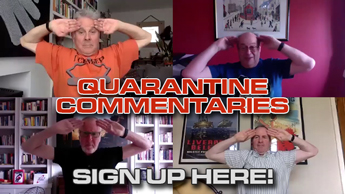 |
Camille Calling Mr Flibble gets on the blower to Camille actress, novelist and Robert Llewellyn's other half - Judy Pascoe. |

Andrew Ellard
Balancing a chair on his beak, Mr Flibble asked how Judy began performing with a CIRCUS?
I started performing when I joined the circus - that was my first job. I was an acrobat in Circus Oz for five years. I had to get a job after I finished Uni, but I didn't want to get a normal job so I decided to join a circus. That's really the only 'proper' job I've ever had! (Laughs)
I think I was in the right place the right time - seven or eight people had just walked out of the circus, so they were taking anyone! We very quickly worked with the Nanjing acrobatic troupe from China, and I learnt loads of stuff in a really intense three-month period. That's when I learnt my act, which was balancing three eggs on a chop-stick on my nose. I couldn't do anything in the beginning, and I didn't really want to do it either because I didn't really like circuses... but I had to do something.

Then I left and moved here to England and I started doing solo performances. I did stand-up because I had no money, which was a great way to earn money, but a bit shocking because you have to go on stage and be funny! (Laughs) But it's brilliant what happens when you need to pay rent, and you've got no other way of paying it. It was prostitutional stand-up comedy!
How did you MEET ROBERT?
Robert and I were performing in Edinburgh together, we were on at the Assembly Rooms in the Fringe. I was on after him. We saw each other every day [in Edinburgh] when we changed over after he'd finished his show. And it was a really quick change over, about fifteen minutes, but we'd meet in the bar afterwards.
But actually we met in Glasgow, at the Tron [Theatre]. We went and had our fifteenth anniversary there last year. We went and stood at the same bar - it was very romantic. The children were so unimpressed, they couldn't care less. (Laughs)

Moaning about actors who have friends in the right places, Mr Flibble asked why Robert put Judy up for the role of CAMILLE?
It's so hard to ask anyone to put on that awful rubber thing, so they asked Robert if I'd do it and I went in and read the lines for them. But really it was more to do with who would wear this hideous mask! It's fine actually - it's fine to do it once, I quite enjoyed it.
How did it compare to what you'd heard?
Robert can be quite a drama queen! (Laughs) He'd be the first to admit that he can be quite over-the-top and dramatic, so he does tend to... I don't want to use the word exaggerate, but something like exaggerate, but not exaggerate! (Laughs) The things that he feels are real for him, but for those of us around [him] they seem like he is bigging things up a bit.
It is quite unpleasant. The worst thing about it is you don't look like yourself. When I talk to Robert when he's got the mask on, I find it almost impossible to speak to him. But the rest of the cast and the production team are so used to it, they just acted really normally around him. I found it hard to look at him, and when I was in it I felt really quite isolated. That was the worst thing about it.
Was your Camille costume made to fit you?
I didn't do a full body cast, just the head, and I think I borrowed a pair of Robert's spare gloves, so I didn't have the full-body experience, unfortunately! If we did we could have life-size casts of the two of us at the entrance to our house to welcome people. How appalling would that be! (Laughs)

Mr Flibble has twin polar bear statues outside his front door. You must have had the same FX-team make a head cast...?
The effects team cast me and it is bizarre. I knew what to expect, and I think if you do get claustrophobia it is probably unpleasant, but there's only really a couple of moments when you're completely covered. And you can always breathe through your nose. I didn't mind it then, but I might be completely different if I had to do it now.
I can imagine that you could, over the years, get worse at doing it rather than better. If you're tired at the time or feeling emotional, then it could affect you. I know Robert did [find it difficult] last time he had to do it [for the movie]. He may also have been imagining wearing the mask for another however-many-days...
That doesn't mean that we wouldn't love the film to happen! It would be so great, because it's such a great family. We really miss everyone - because you're so intensely in those people's lives whenever you film, especially when there was a series every year or two years. We'd catch up and meet everyone again, and see all the partners and children, Doug and everyone. I think everyone so wants to work with each other again... even though they will whinge and it will be so painful and hideous, at the same time they really get on so well.
What about the Camille voice?
First of all they wanted Swedish - I don't know why! So I did a Swedish accent but it was a bit repetitive. So then we just thought it should match Kryten's somehow and be some kind of American type accent, because I think all the others were trying to match, like Kochanski had a similar Scouse accent, and then Rimmer's other half is very English.
What did family make of it?
The first time my eldest boy saw it he got really upset because I wasn't there and he thought mummy had turned into a green blob. He was at Granny's house and he cried and cried! [But] he didn't mind the robot face, and it was the same with Robert when he went on set as a tiny kid - he never noticed the make-up somehow. I remember watching him run up to Robert between takes and give him a huge cuddle, even though he was dressed as this robot! Maybe it's only adults who look at someone and think, 'oh, that person looks really odd'. He didn't have that judgement mechanism at all: he could hear Robert's voice, so that was dad.

Mr Flibble's children are always a little confused when they see someone with their hand up his backside. Andrew changed the subject to Judy's WRITING.
When I had the kids the performing thing got too difficult. So I started writing, which I'd always done sort of because of the stand-up, and I did want to experiment more, and it was a great opportunity. I liked the idea of not throwing away everything you've written, which is what you've got to do when you do stand-up. You're basically throwing everything out to find the one line that's funny. I used to throw everything else out and think, 'Wouldn't it be great to actually sit down and keep all that stuff - I guess you'd have to write a book!'
So I started doing film scripts, without knowing that film writing is pretty much the same as stand-up - you have to throw everything out and keep the essential bits, so that was still incredibly frustrating. I tried to get my first script made into a film, unsuccessfully, but [then] I started doing script-doctoring which I really enjoyed. That was a great job because it didn't matter because it wasn't your film - you were cutting and pasting and changing. It was a script for Disney and I learnt lots from them. They're fantastic on structure and their rules and the bible that they work from.
It was a great way to learn to write, and that's how I write my novels - from what I learnt screen-writing. I write in three acts. I think you've got to have a plot. So many books I read I think the writers are really lazy - you've got to have a story as well as fantastic characters, as well as a style. You've got to have it all! The plot is really important to me, and it drives me insane getting the plot and the characters right so that you don't 'see' either of them. You have to be incredibly patient and I'm so not a patient person!
Your first novel, Our Father Who Art In The Tree, is set in Australia and told from the point of view of a ten year old. Is there a certain autobiographical perspective there?

I'm going to go to Australia next time and write a book set in England - I have to have distance from my subject! (Laughs) I suppose I used the emotions of my childhood, but put them into a fantasy story. I love doing that because then you get to make stuff up. That's the great thing about writing, you have to fictionalise real things. The second one is set in Australia as well, with a fifteen-year-old narrator. The first one actually won the Young Minds award here [in the UK], but it came out as an adults book. It crossed over and all these young adults started reading it, so they're going to do two editions of the next one - an adult version and a kids version, which is great because you widen your audience.
The first book came from a screenplay, so I knew the structure quite well and it was quite easy to write for that reason. It's quite short - I just wanted to see if I could do it, and then I got that published pretty quickly and got a second book deal. But this one has been much harder because I had to work out the plot and all the talky joiny bits; it's just been really hard. There are days when you think this is the worst job in the world, only an idiot would do this - and then other days when it's great, I'll go home and I won't kick the cat tonight! (Laughs)
When does your new one, Dreaming In French, come out?
This one's coming out next May [2005]. It's already a year late, because I very flippantly said 'give me 12 months to get the next one out', and then it took me 12 months to sit down and realise what it was a about, and then another 12 months to write. But I'm nearing the end now. I write by hand and put it into the computer later on, so it means I'm more portable and I can write in lots of different places, which I like. Also I get kind of another draft when I transfer it onto the computer.
Both the books have got a ghost type element to them, a fantastical side to them. I don't know about the next one. That's what I'm depressed about, I haven't finished this one and I've got to start the next one! Not many writers ever say how difficult it is. Maybe either they don't find it difficult, or they don't actually talk about the part that is incredibly painful - which is the discipline, working by yourself, feeling lonely, reaching a brick wall with a plot.
Perhaps when they're on their fantastic book tours they've got the rose-coloured glasses on and they've forgotten that there were times in the process when you could almost have been hospitalised for insanity. It's like at the end of Red Dwarf, when they would all say they were never doing that again, and yet come the next year they're all lined up ready to go in front of the cameras. And now they'd do anything to get back!
Mr Flibble enjoyed talking to Judy Pascoe, and now that it's over... Mr Flibble is very cross.














